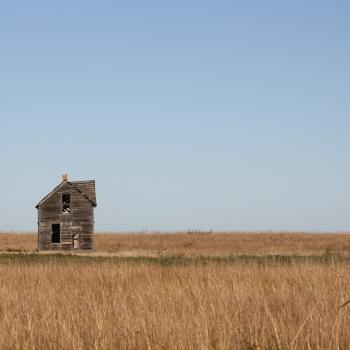
Good news! Optimists live longer! True fact. And one more reason for curmudgeons to find optimists insufferable.
A recent study out of Boston reported on by NPR describes how, among other things: “people who tend to be optimistic are likelier than others to live to be 85 years old or more.” And while bad things and stress happen to optimists at the same rate as they do for pessimists, an optimistic attitude tends toward resiliency and rebound. Optimists bounce back from tough stuff and aren’t affected as much over the long term by negative events.
How does this sit with Christian faith?
On the one hand, there’s a strain of biblical realism–most especially in the book of Ecclesiastes–that faces life with a flinty gaze. Call it faithful pessimism. Chapter 7 of Ecclesiastes, written from the vantage of King Solomon’s bitter old age, could be summed up as: “life sucks and then you die, so what’s the point?” Solomon goes so far as to say “Don’t be too good or too wise. Why destroy yourself?” It’s a statement that would seem to fly in the face of, well, pretty much everything else the Scriptures teach on the pursuit of virtue and wisdom. All of this is a decidedly un-optimistic view, one that that Solomon’s Ecclesiastes shares with Elijah the prophet and Thomas the apostle–at least at times. Elijah despairs and crashes under the broom tree, and Thomas thinks Jesus’ decision to go to Bethany means Jesus is going to die–and the disciples with him (1 Kings 19; John 11:16). This biblical view sees life in all its inscrutable, terrible grandeur and refuses to flinch away. It’s an attitude of stubborn and faithful pessimism that clings to God and keeps putting one foot in front of the other no matter how bad things get. You can’t disillusion the disillusioned.
And yet, the Christian view of the world is inherently hopeful. God is real and Jesus is alive, so there’s always more to the story. Suffering produces endurance produces character produces hope (Romans 5:3-4). Some of this hope comes from a steadfast conviction that life continues after death, and that when calculated across that broad ledger, God’s will and ways, God’s justice and mercy, add up. But that’s not the whole of it. Christian hope doesn’t arise from a stubborn refusal to acknowledge the hard facts of life or from calculations of just deserts. Christian optimism is a category of awareness, the willingness to be surprised by God’s activity in our lives and history. In this sense, Christians are called to cultivate an aware optimism.
Where faithful pessimism and aware optimism meet is in the way that both call us to look at life with deep honesty. They both require the willingness to be surprised and the conviction that there is more going on. Thus the prophet Elijah may think all is lost and he’s the only prophet left, but surprise! God has preserved 7,000 in Israel, and Jehu will be king, and Elisha will be Elijah’s successor prophet (1 Kings 19:16-18). The apostle Thomas may think Jesus is going to die. He’s right. But surprise! Jesus first has to reach into the guts of death and raise Lazarus from the grave (John 11:43). There’s this snap of awareness that God is present in ways deeper than all that’s wrong.
Lack of awareness is the risk of pessimism. Pessimists can fail to see the goodness that surrounds them, the ways that God shows up in their lives. I know, because I may have just a wee bit of a pessimistic, curmudgeonly streak.
What’s helped me has been the daily practice of the prayer of examen. The examen is just like what it sounds: an examination of life, noting the times throughout the day when I was unhappy or life was sucked from me, but also the times when I experienced joy and God was present to me. It turns out that there are many more instances of God’s presence throughout the day than a person realizes.
Not long ago, the train of my to-do, do, do list was derailed by one of our sons getting sick at school. My afternoon got reshuffled and my plans went splat. Later, I went out for a walk in the cool of the evening with my other sons. The day was shot. The to-do list was idling. But for some reason, I was caught up by a surprising awareness that life and time and work are all gift. I can’t say what it was exactly: the beauty of the night, the realization that children grow and these life vignettes are forgotten. I don’t know. But something about the moment struck me as a precious gift in its fleetingness.
For all that, God is the ultimate gift-giver. True fact. And one which I suppose ought to convert all of us to optimism. Or at least make us a tad less curmudgeonly.












